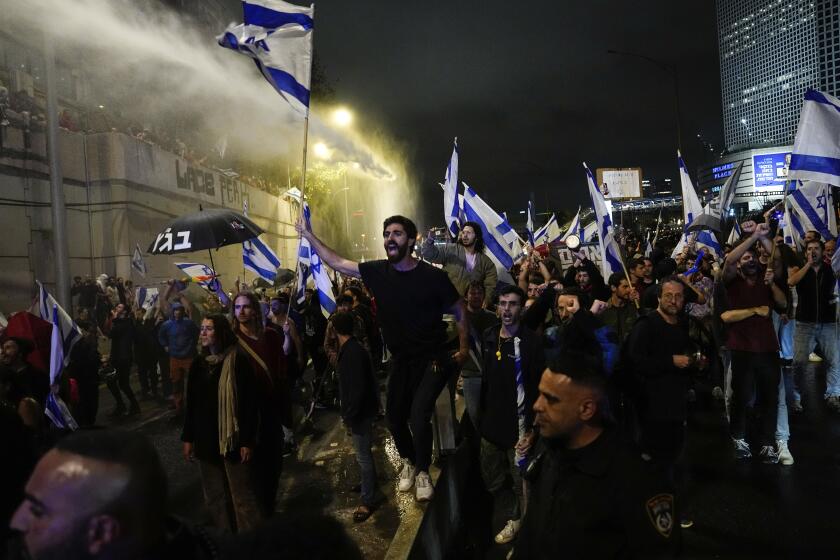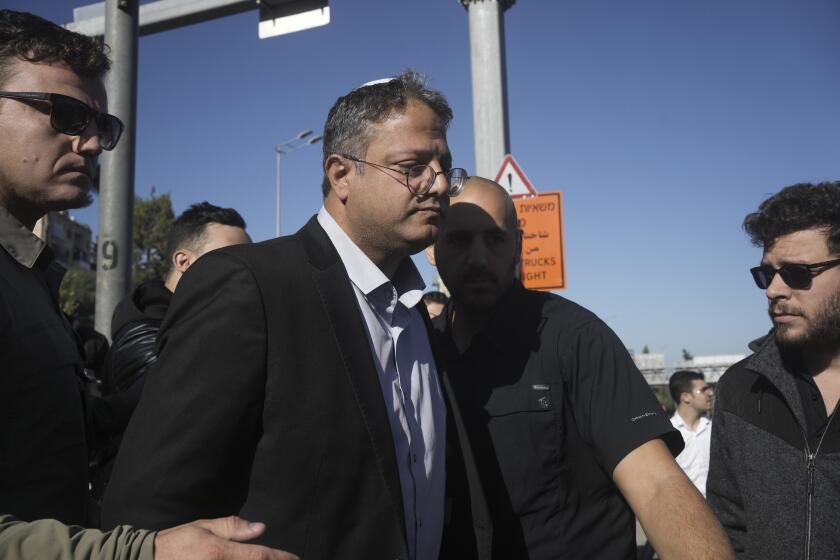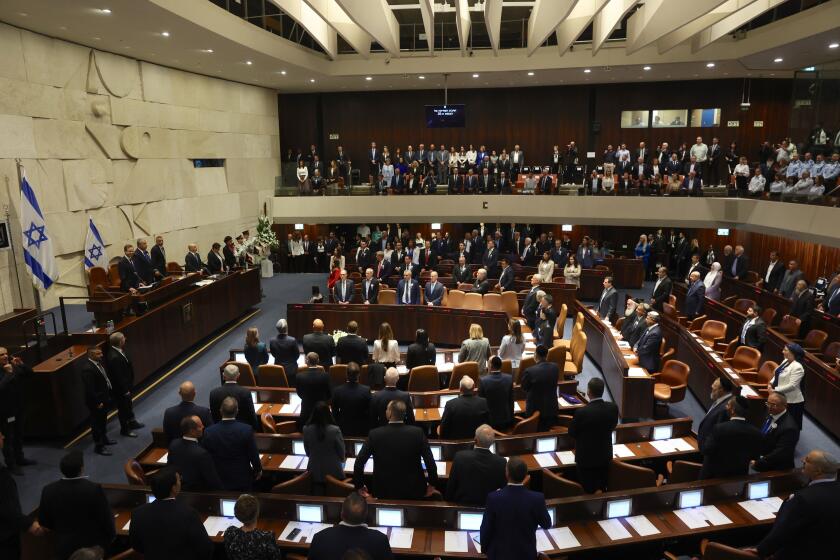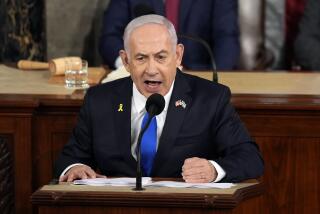News Analysis: Israel’s protests, Netanyahu and the crisis his government unleashed
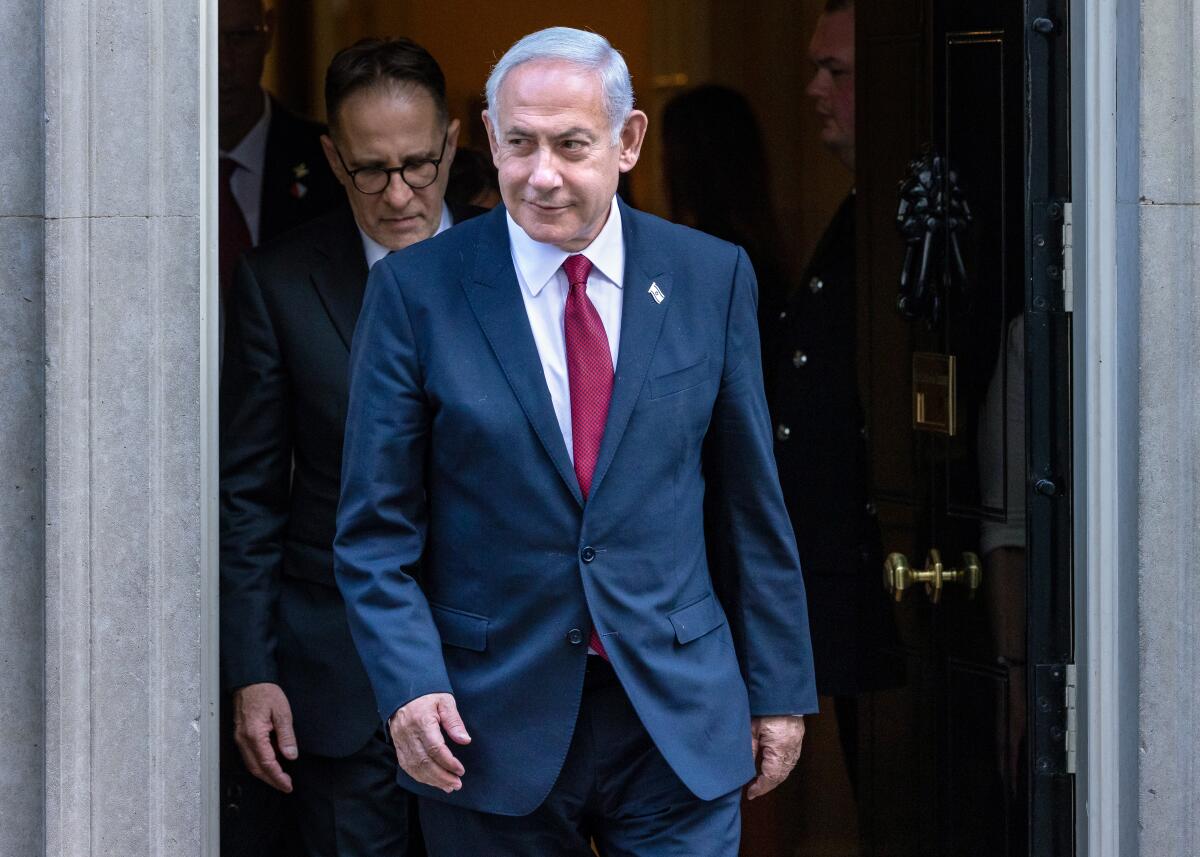
WASHINGTON — Benjamin Netanyahu, Israel’s longest-serving prime minister, is a legendary master of political survival. For once, he may have overplayed his hand.
As he frantically plots a strategy to emerge from the worst domestic crisis in Israel’s 75-year history, Netanyahu must find a way to keep his radical, ultra-Orthodox coalition partners on board while attempting to pacify the hundreds of thousands of angry Israelis filling the streets in the name of defending democracy.
If he fails, his government could easily dissolve. If that were to happen, it is unclear who would fill the void or what new unrest could be ignited.
Israel has long been synonymous with conflict, but for the moment, the most serious existential threat it faces comes not from its Arab neighbors but from its own internal divisions.
Netanyahu late Monday announced he would postpone — but not cancel — his plans to overhaul Israel’s Supreme Court and judiciary in a way that would make judges more beholden to politicians. He said he was acting “to avoid civil war.” Critics say the plan would destroy the checks and balances that have made the courts an important pillar of Israeli democracy.
“When there’s an opportunity to avoid civil war through dialogue, I, as prime minister, am taking a timeout for dialogue,” Netanyahu said in a nationally televised address.
Israeli Prime Minister Benjamin Netanyahu fired his defense minister a day after Yoav Gallant called for a halt to an overhaul of Israel’s judiciary.
The vote in the Knesset, or parliament, will be delayed until after the Passover break, which starts next week.
It was not clear, however, whether postponement would placate the opposition, which has swelled from the left to include Israelis of all political persuasions as well as the military, the Mossad spy agency and high-tech entrepreneurs.

After 12 weeks of regular demonstrations, a far larger segment of Israeli society was galvanized over the weekend when Netanyahu abruptly fired his defense minister, Yoav Gallant, who became the first government member to openly criticize the judicial overhaul. The retired major general warned that the plan had already weakened Israel’s national security by alienating legions of military personnel, from elite combat pilots to army reservists who refused to report to duty in protest.
Israel burst into rolling chaos Monday. The country’s largest trade union — the umbrella organization Histadrut, with some 800,000 members — called on members to observe a general strike. That forced a partial shutdown of the international airport — which Israel has prided itself on keeping open through numerous crises — with outgoing flights canceled and thousands of passengers stranded.
The protest strike also triggered walkouts at universities, hospitals, ports and even all of Israel’s embassies and consulates the world over. Public transportation was curtailed, and the fast-food behemoth McDonald’s closed its doors.
After Netanyahu’s remarks Monday night, Histadrut called off the strike.
At 16, Yoel Levy fled Lev Tahor, a fringe Jewish sect accused of child abuse that made its home in Guatemala. He’s now fighting to get his family out.
Israel’s figurehead President Isaac Herzog, who has warned of the danger of Israel plunging into civil war, urged Netanyahu to halt the judicial overhaul. “Our security, economy, society — all are under threat,” Herzog said Monday. “Wake up now!”
Herzog later welcomed Netanyahu’s decision to pause.
In what might sound to many Americans like a familiar tactic, Netanyahu cast his critics and not himself as a threat to the country’s security, and sought to position himself as a victim of perfidious judges and prosecutors. He is on trial on corruption charges for allegedly doing favors for wealthy businessmen in exchange for gifts and favorable media coverage.
The most radical members of his government are not likely to give Netanyahu much space to maneuver.
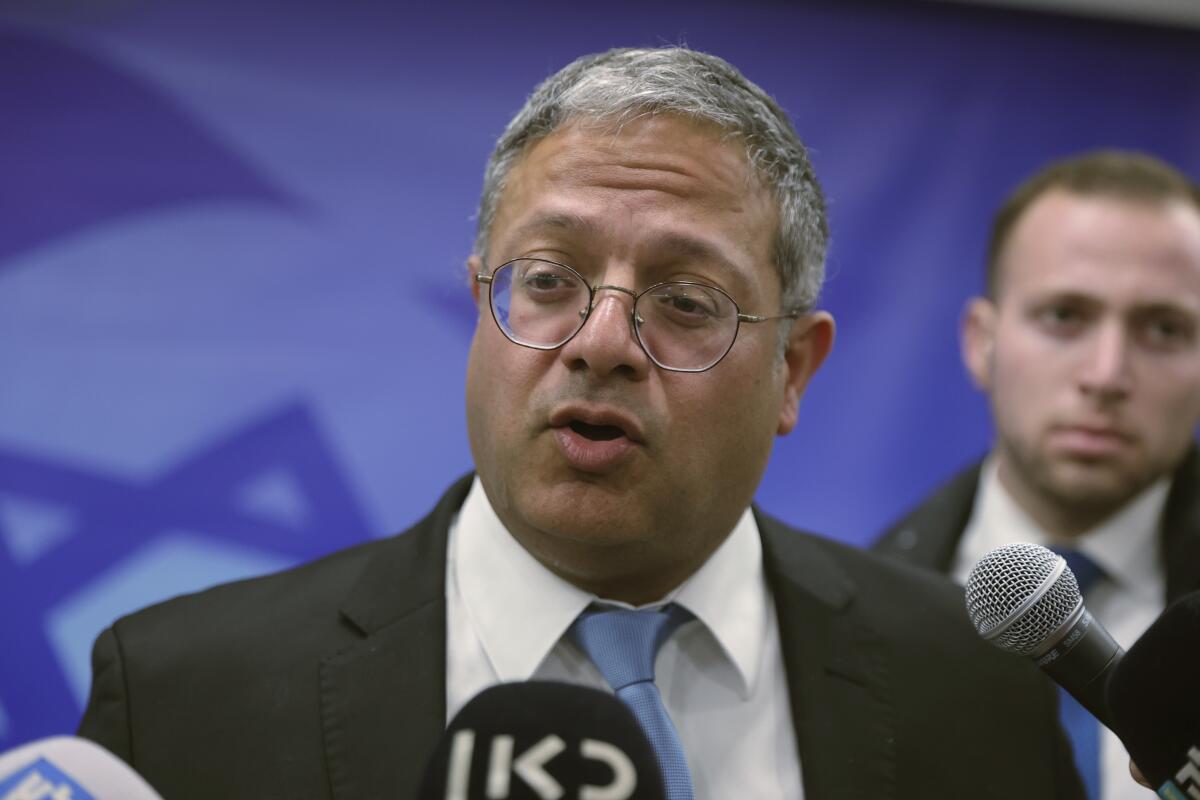
Itamar Ben-Gvir, the ultranationalist security minister whose history of anti-Arab hate has made him a lightning rod for much of the criticism of the government, said that when the debate over the judicial changes resumes, lawmakers would consult with the opposition to find a compromise. But if that proves impossible, he said, the overhaul would proceed.
Earlier, he had warned Netanyahu not to “surrender to anarchy.” In fact, some of the same right-wing political allies who threw Netanyahu a lifeline in forming this government now appeared poised to turn on him if he tried to compromise with his foes.
Itamar Ben-Gvir, who has a long record of extreme anti-Arab rhetoric, is promised the post of national security minister in Israel’s new government.
Nor has Netanyahu found much support abroad. His polish as a statesman has long been a major component of his carefully crafted self-image and a tool for creating distractions from domestic political crises.
But those vaunted powers appeared to be deserting him as he made the recent rounds of the main European capitals, dogged by demonstrators and chastised by the leaders of France, Britain and even Germany, loath to criticize Israel ever since its establishment after the end of World War II. Expatriate Israelis, including many American Jews, have emerged as among his most vehement critics.
The Biden administration has taken a more measured approach, refusing to defend Netanyahu but also refraining from harsh condemnation as he has repeatedly violated his pledges to American officials not to expand Jewish settlements on Palestinian land in the West Bank and his promises to seek consensus on his judicial overhaul.
Israel has sworn in its most religious and right-wing parliament after nearly four years of political deadlock and five elections.
Senior administration officials said they are pursuing quiet, behind-the-scenes diplomacy. But they also acknowledge they don’t want to criticize Israel too forcefully.
“We have been very consistent and very clear both privately ... [and] publicly that the concern about this pending legislation is that it would fly in the face of the whole idea of checks and balances,” John F. Kirby, a spokesman for the U.S National Security Council, said Monday.
Kirby said President Biden, in a telephone conversation last week with Netanyahu, was “very, very forthright” in stressing the need to “find a way forward based on compromise ... with the broadest possible base of popular support.”
Israel was one of 122 countries the U.S. invited to Washington for its Summit of Democracy this week, and Netanyahu is scheduled to speak. U.S. officials, repeatedly pressed, refused to comment on whether he was still part of the program.
Even before he began presiding over the most right-wing government in the state’s history, Netanyahu had long exploited the fault lines that have riven the country into warring camps. It was part of his formula for success.
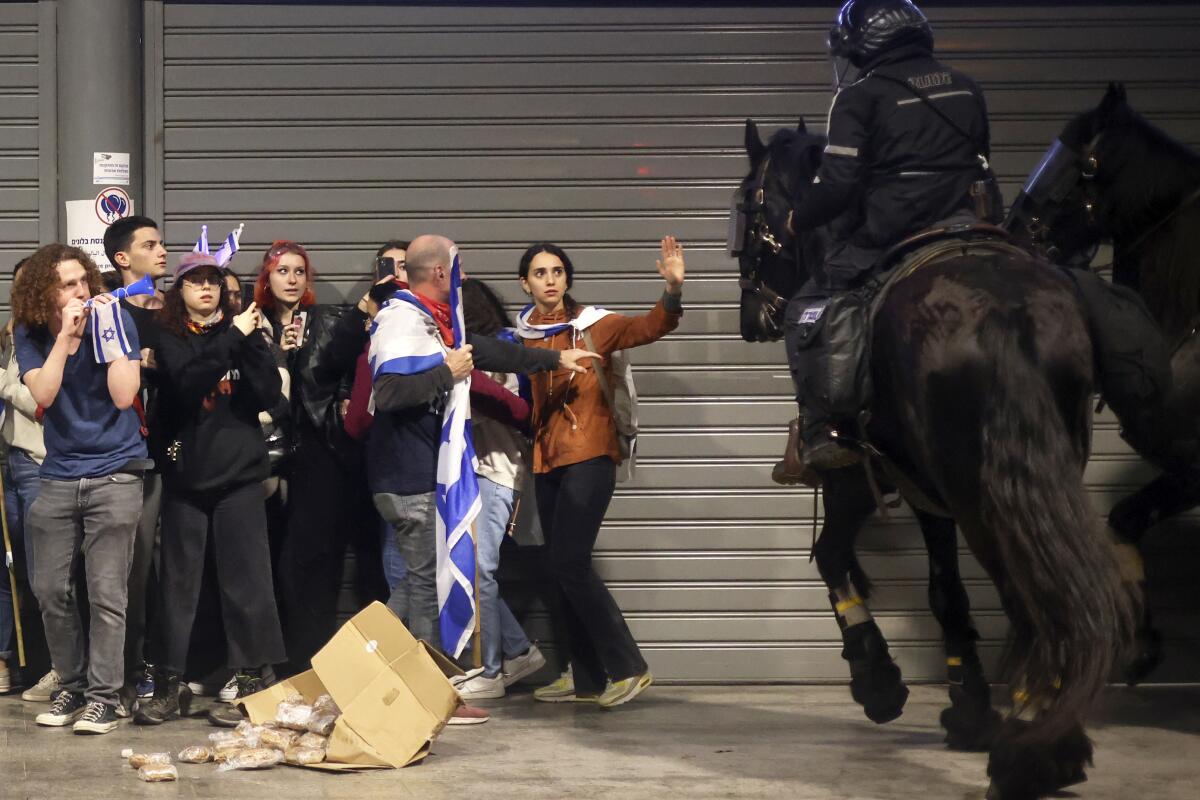
But weeks of protests have also created odd political alliances, with some traditional rivals finding common ground in the notion that the prime minister has embarked on an enormously destructive path.
And in the Jewish diaspora, some of Israel’s most loyal supporters have begun to come out against the plans and actions of Netanyahu’s government.
At a rally outside the Israeli Embassy in Washington over the weekend, several hundred protesters — mostly American Jews — waved blue-and-white Israeli flags and chanted “democracy!” in Hebrew and English as they called for Netanyahu to shelve permanently his plans for the judiciary.
Martin Indyk, one of the most well-known U.S. diplomats involved in the Middle East, spoke to the crowd. He admitted it was the first time he had ever addressed a protest rally, since he was usually on the inside, making policy.
“Israel is in trouble,” said Indyk, a two-time U.S. ambassador to Israel and special envoy and Middle East negotiator in the Obama and Clinton administrations. Subordinating judges to politicians in a country that doesn’t have a constitution, Indyk warned, “will undermine not only Israel’s democracy but it will undermine the relationship between the United States and Israel.”
The strategic interests and values that the U.S. and Israel share, including the hundreds of billions of dollars Washington has dedicated to Israel’s military capabilities, “have also been undermined as a result of this assault on Israel’s democracy,” Indyk said.
Most of the participants identified themselves as lifelong Zionists dedicated to Israel. And that, they said, is why they were protesting.
“This demonstration in no way, shape or form can be perceived as anti-Israel,” said Susie Gelman, longtime activist in Jewish organizations and now chair of the Israel Policy forum, an advocacy group. “This is for Israel ... for Israel’s future, which is so closely linked to our future as American Jews.”
Similar rallies are being held in capitals all over the world.
At an anti-Netanyahu protest in Berlin on Monday evening, demonstrators shouted “Shame! Shame!” when word emerged of the deal under which the prime minister would temporarily pause his effort to ram through the changes to the judiciary — but would also mollify a key far-right partner.
“He’s acting only out of his own private interests,” 29-year-old Israeli pianist Matan Fishov, who is living and working in the German capital, said of the Israeli leader. “I’m so worried about our democracy.”
Wilkinson reported from Washington and King from Berlin.
More to Read
Sign up for Essential California
The most important California stories and recommendations in your inbox every morning.
You may occasionally receive promotional content from the Los Angeles Times.
